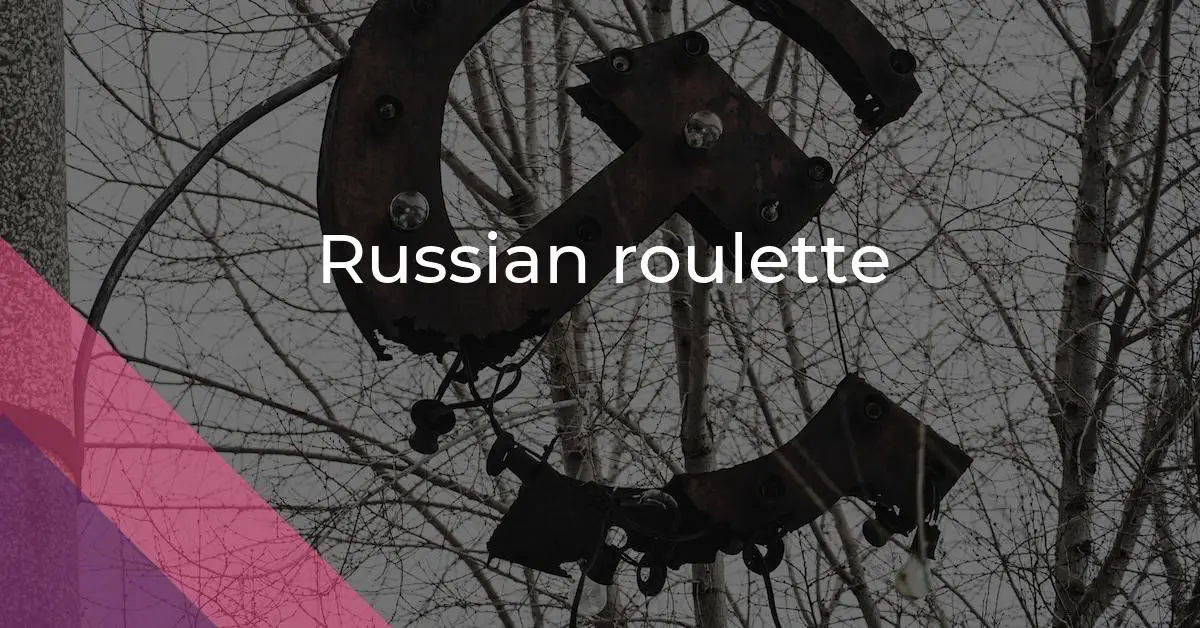Russian roulette: Idiom Meaning and Origin
What does ‘Russian roulette’ mean?
The idiom Russian roulette refers to a risky or dangerous activity with potentially fatal consequences, where one takes a chance with their own life or well-being.

Idiom Explorer
The idiom "run with scissors" means to take unnecessary risks or engage in dangerous activities without considering the potential consequences.
The idiom "run the gauntlet" means to go through a difficult or dangerous experience where there are multiple challenges or obstacles to overcome.
The idiom "run a risk" means to take a chance or engage in an activity that could have negative consequences or uncertain outcomes.
The idiom "roll the dice" means to take a risk or make a decision without knowing the outcome or consequences.
The idiom "roll of the dice" means taking a chance or accepting a situation where the outcome is uncertain and unpredictable.
The idiom "ride one's luck" means to depend on chance or luck, often in a risky or daring situation, rather than on one's own skills or abilities. It suggests taking advantage of favorable circumstances without having much control over the outcome.
The idiom "push one's luck" means to take a risk by continuing to do something in a way that may result in negative consequences. It implies exceeding the limits of what is sensible or safe, often arrogantly or overconfidently. This idiom warns against testing good fortune too much, as it may lead to unfavorable outcomes.
The idiom "professional suicide" refers to actions or decisions that can severely harm or ruin one's career, reputation, or professional standing.
The idiom "play with fire" means to engage in a dangerous or risky activity, often knowing the potential consequences but still proceeding anyway.
FAIL
The idiom "Russian roulette" is a popular expression that originated in the mid-20th century. It has gained widespread recognition over the years, symbolizing a risky or dangerous situation where the consequences are uncertain. Derived from an actual deadly game, this idiom serves as a potent metaphor for taking unnecessary risks and making choices with potentially dire consequences.
Historically, "Russian roulette" refers to a game of chance believed to have been played in Russia. It involved a loaded gun with a single bullet in the chamber. Participants would take turns pointing the gun at their own heads and pulling the trigger, fully aware of the chance that the gun could discharge and cause their death. This reckless game encapsulated the element of randomness and the potential for disastrous outcomes.
Nowadays, the term "Russian roulette" is used metaphorically to describe any action or situation characterized by a high degree of risk or uncertainty. It conveys the idea that someone is willing to take a dangerous chance, often driven by a desire for thrill or a disregard for consequences. This idiomatic expression effectively illustrates the potential consequences of risky decisions or actions, emphasizing the unpredictable nature of the outcome.
The origin of the game itself remains uncertain, but it is believed to have emerged during the late 19th or early 20th century. The portrayal of "Russian roulette" in popular culture, particularly in movies and literature, has contributed to its widespread recognition as a symbol of perilous behaviors and choices.
The idiom "Russian roulette" is closely related to the idioms "roll the dice," "roll of the dice," and "run a risk." Each of these idioms denotes a sense of risk and uncertainty.
The expression "roll the dice" is often used to describe a situation where someone is willing to take a chance or try their luck. It implies a willingness to accept the possibility of both positive and negative outcomes. In the context of "Russian roulette," this idiom emphasizes the element of chance and the unpredictability of the outcome, similar to the game itself.
The idiom "roll of the dice" carries a similar meaning, emphasizing the notion that certain situations or decisions involve an element of chance. It implies that the outcome is not entirely within one's control and depends on luck or fate. In the case of "Russian roulette," this idiom underscores the uncertain nature of taking unnecessary risks and the potential for catastrophic consequences.
Lastly, the phrase "run a risk" is another idiom connected to "Russian roulette." It signifies a willingness to face the potential negative consequences of an action or decision. It conveys a sense of acknowledgment that there is a chance of failure or negative outcomes. In the context of "Russian roulette," this idiom highlights the potential dangers and the willingness of individuals to engage in risky behavior despite the potential risks involved.
"Russian roulette" is an idiom that conveys a sense of danger, risk, and uncertainty. Its origins can be traced back to a deadly game believed to have been played in Russia. As a metaphorical expression, "Russian roulette" serves as a warning against taking unnecessary risks and making choices with potentially dire consequences. It has become deeply ingrained in popular culture, reinforcing the notion of a gamble where both the outcome and the stakes are uncertain. When considering related idioms such as "roll the dice," "roll of the dice," and "run a risk," they further emphasize the element of chance, uncertainty, and potential danger associated with "Russian roulette."
Example usage
1. He decided to play Russian roulette with his career by taking on a high-risk job opportunity.
2. Going hiking without a map or any supplies is like playing Russian roulette with your safety.
3. Choosing to drive home after having several drinks is like playing Russian roulette with your life and the lives of others on the road.
More "Gambling" idioms



